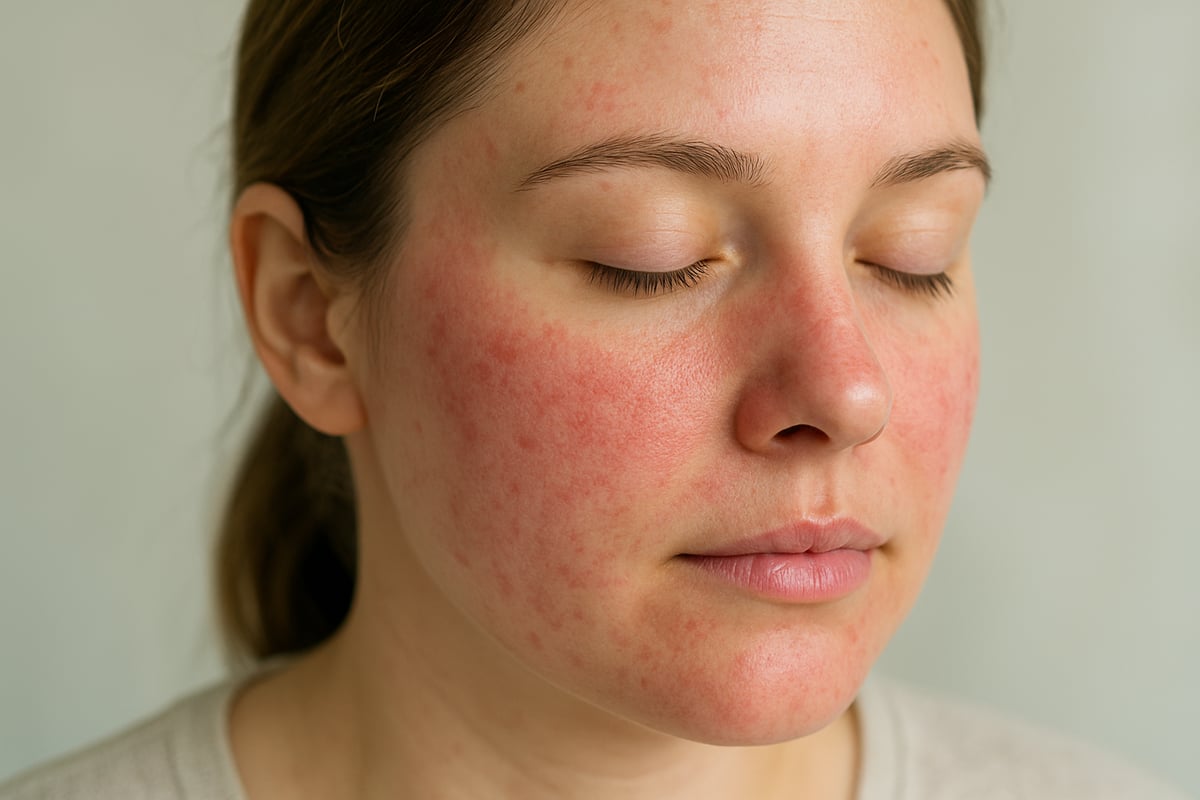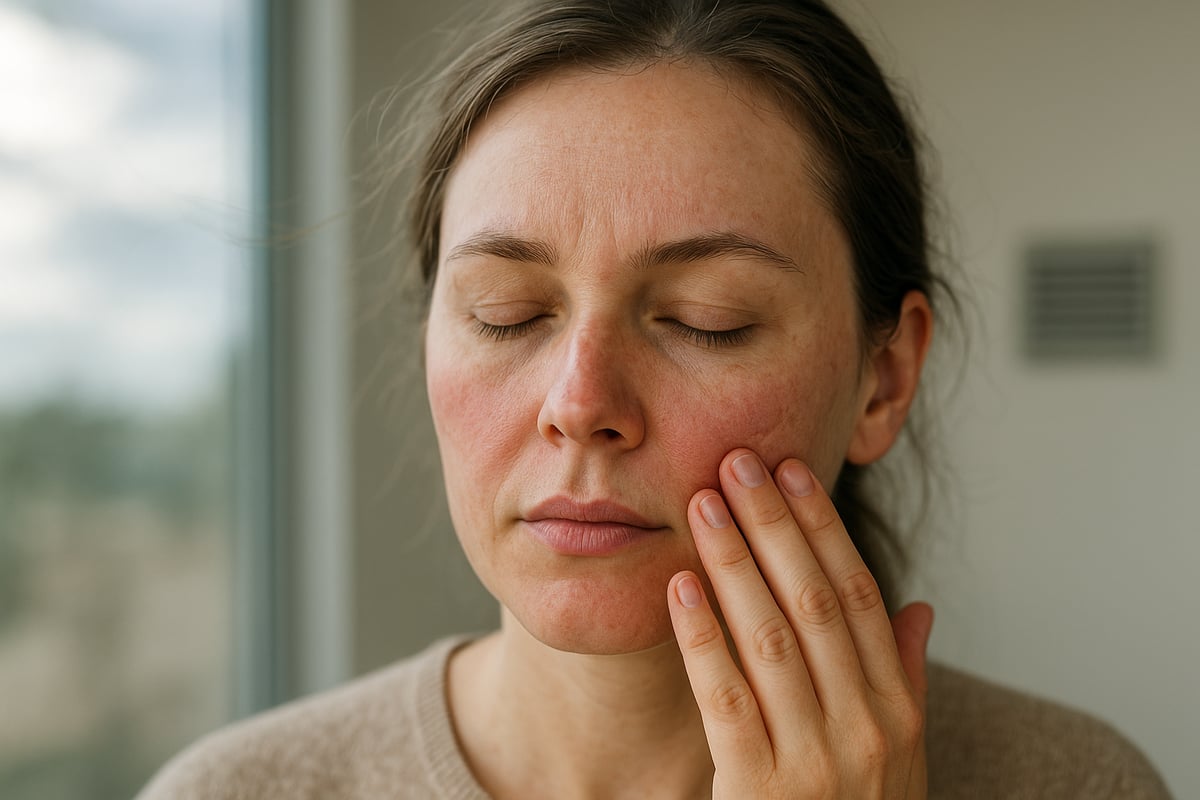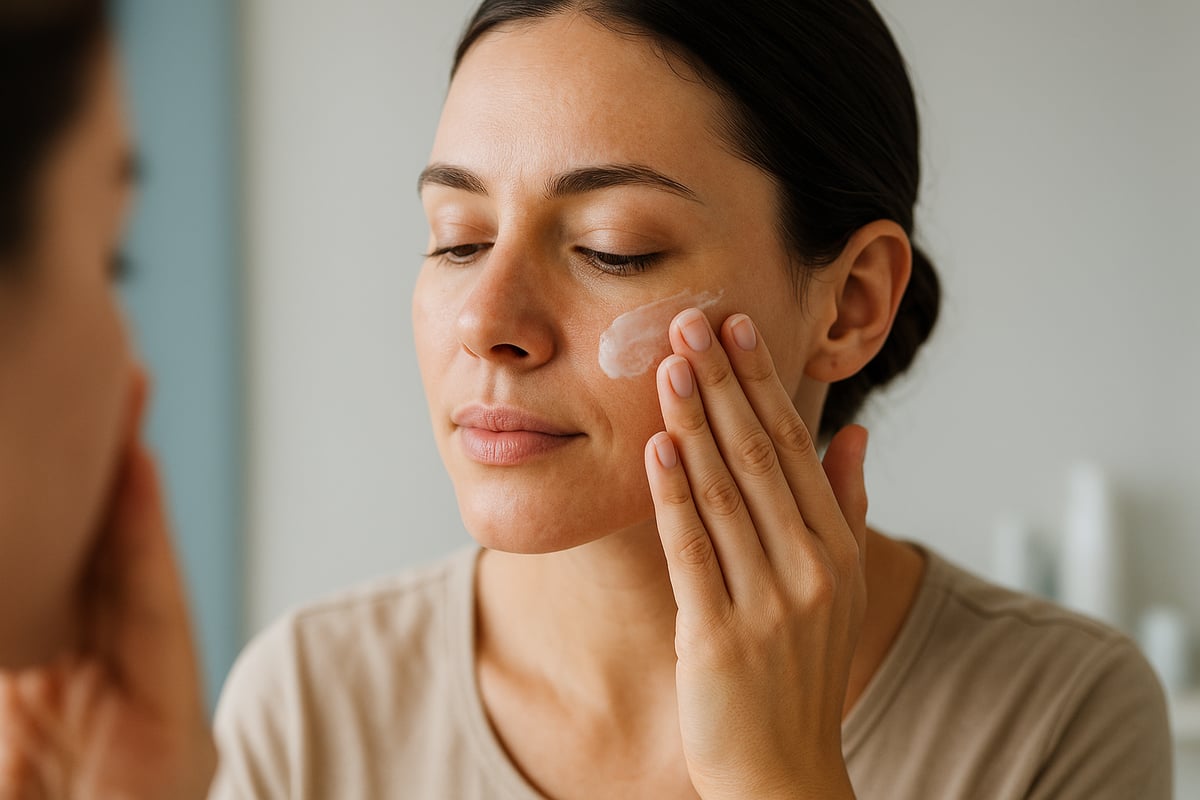Many Swedes experience daily problems with sensitive skin and wonder what it really means. In this guide you will get all the important knowledge about sensitive skin 2025, from causes and symptoms to effective treatments and product choices. We go through the differences with reactive skin, scientifically proven advice, and expert tips for your daily skin care routine. Become aware of common pitfalls, discover new research findings and learn how you can take control of your skin health with practical and simple steps.
What is sensitive skin? Definition & characteristics
Understanding sensitive skin is crucial to being able to take care of your skin properly. Many Swedes experience symptoms of sensitive skin at some point, but what does it really mean? In this section, we will go over what sensitive skin is, how it differs from other skin types, common signs, the difference from reactive skin and which conditions are often linked to sensitive skin.

How sensitive skin differs from other skin types
Sensitive skin is not a skin type, but a condition that can occur in all skin types, regardless of whether the skin is dry, oily or combination. What distinguishes sensitive skin is that the skin's barrier function is impaired, making it more susceptible to both external and internal factors.
Unlike other skin types, sensitive skin often reacts with redness, irritation and discomfort when in contact with, for example, weather changes, skin care products or stress. According to Hudbesvär – statistics in the field of public health, up to 60 percent of women and 40 percent of men experience symptoms of sensitive skin.
Common misconceptions are that sensitive skin is always dry, but oily skin can also be sensitive. For example, people with sensitive skin may experience redness or tingling from completely normal products that others tolerate without problems.
Common symptoms and signs of sensitive skin
The symptoms of sensitive skin vary, but some signs are particularly common. Redness, rashes, and swelling are typical, as is a stinging, burning, or tight sensation after cleansing or with temperature changes.
Other signs of sensitive skin include:
- Itching and irritation
- Visible superficial blood vessels (telangiectasias)
- Quick reactions to new products
- Chronic or recurring problems
Many people notice that sensitive skin becomes red and flushed after a shower or when exposed to cold weather. The symptoms can be long-lasting or come in fits and starts, making it important to pay attention to patterns in the reactions.
The difference between sensitive and reactive skin
It is important to distinguish between sensitive skin and reactive skin. Sensitive skin often involves more long-term problems, where genetic or hormonal factors play a major role. Reactive skin, on the other hand, reacts quickly and temporarily to specific triggers, such as strong products or physical touch.
The difference can be summarized in the table below:
| Skin type | Duration | Triggering factors | Example of reaction |
|---|---|---|---|
| Sensitive skin | Prolonged | Genetics, hormones, environment | Redness, irritation |
| Reactive skin | Brief | Specific topics, touch | Temporary flushing |
A person with sensitive skin may have lingering discomfort, while reactive skin often quickly returns to normal. Understanding the difference is crucial in choosing the right treatment and skincare routine for sensitive skin.
Examples of conditions linked to sensitive skin
Several skin conditions are closely associated with sensitive skin. Atopic eczema, rosacea and acne are common diagnoses where skin sensitivity plays a major role. Hormonal changes, such as during pregnancy or menopause, can worsen the symptoms of sensitive skin.
Other factors such as allergies to perfume, preservatives and other substances increase the risk of sensitive skin. Statistics show that allergy sufferers and the elderly are more often affected. Children and infants also have thinner skin and thus a naturally increased sensitivity.
Knowing these conditions and risk groups is important in order to prevent and manage sensitive skin in the best way.
Causes of sensitive skin: Internal and external factors
Understanding why sensitive skin occurs is crucial to preventing and relieving the condition. The causes are often a combination of internal and external factors, and they vary between individuals. Below is an overview of the most common causes of sensitive skin.

Genetic and biological causes
For many people, sensitive skin is partly hereditary. If you have relatives with similar conditions, you are more likely to be affected. It is about genetic factors that determine how strong the skin barrier is and how well the skin can bind moisture.
People with fair skin often have a thinner and weaker barrier, making them more susceptible to irritation. Statistically, heredity is one of the main causes of sensitive skin, according to pharmacy advice. Sensitive skin can affect anyone, but some are born with a greater vulnerability.
In practice, this means that your skin may react more strongly to common external factors, even if you use gentle products. Understanding your genetic predisposition is an important first step in managing sensitive skin.
External environmental factors and climate
The Nordic climate plays a big role for sensitive skin. Cold, wind and rapid temperature changes can weaken the skin's protective layer. During the winter, many notice that sensitive skin becomes drier and more irritated, while summer can mean problems with UV radiation.
Air pollution and dry indoor air are other common causes of sensitive skin deterioration. According to the Environmental Health Report 2021 — Public Health Agency of Sweden, environmental factors are crucial for skin health in Sweden, especially for those with sensitive skin.
Many people find that the symptoms worsen after a sun holiday or during periods of high air pollution. Protecting the skin from external stressors is therefore crucial for anyone with sensitive skin.
Lifestyle factors: Stress, diet and sleep
Lifestyle has a big impact on sensitive skin. Stress affects the immune system and can trigger inflammation in the skin. When the body is out of balance, for example due to lack of sleep, the skin's recovery is slower and sensitive skin reacts more easily.
Diet also plays a role. High intake of sugar, processed foods, and a lack of antioxidants can increase the risk of sensitive skin. Many people report that stressful periods lead to more redness and itching.
Prioritizing rest, a balanced diet, and stress management are therefore important to reduce the symptoms of sensitive skin. Small changes in everyday life can make a big difference.
Hormonal changes and diseases
Hormonal fluctuations affect sensitive skin throughout life. Pregnancy, menstruation and menopause can lead to changes in the skin's moisture balance and barrier function. Women often find that sensitive skin worsens during these periods.
Conditions such as atopic dermatitis, rosacea and allergies are also strongly linked to sensitive skin. People with these conditions often have a compromised skin barrier and are at greater risk of irritation.
It is important to pay extra attention to your skin's needs during hormonal changes or if you have an underlying skin condition. Customized skin care can alleviate the symptoms of sensitive skin.
Impact of skin care products and treatments
The wrong skincare products can quickly aggravate sensitive skin. Harsh cleansers, alcohol, and perfume are common culprits that damage the skin's natural barrier. Over-exfoliation can make sensitive skin even more reactive.
Switching to gentle, fragrance-free, and moisturizing products is often a simple and effective way to reduce discomfort. Sensitive skin needs products that strengthen rather than weaken the skin barrier.
Step-by-step: How to take care of sensitive skin in 2025
Caring for sensitive skin requires a thoughtful and gentle routine that is tailored to your individual needs. Below is a step-by-step guide on how to best protect, strengthen and soothe sensitive skin in 2025. Each step is based on current research, proven methods and expert advice.

Step 1: Identify and avoid triggers
The first step towards a stronger skin barrier is to get to know your sensitive skin and what triggers it. Keep a simple skin diary where you note reactions related to weather, stress, new products or food. Common triggers for sensitive skin are cold, strong fragrances, alcohol-based products and rapid temperature changes.
- Switch to allergy-tested and perfume-free products.
- Avoid environments with strong chemicals or a lot of dust.
- Always test new products on a small area of skin first.
For specific product recommendations, explore the Sensitive Skin Care Collection , where you'll find specially selected options for sensitive skin. Avoiding known triggers often results in noticeable improvement within just a few weeks.
Step 2: Cleaning – Gentle and effective
Cleansing is the foundation of a balanced routine for sensitive skin. Choose a gentle, fragrance-free cleanser with a neutral pH that won't dry out your skin. Use lukewarm water and avoid scrubbing gloves or harsh exfoliating products. Wash your face gently with your fingertips and pat dry with a soft towel.
- Micellar water is a popular and gentle alternative.
- Oil-based cleansers are particularly suitable for dry and sensitive skin.
- Ideally, only cleanse in the evening if your skin feels stable during the day.
By minimizing friction and harsh substances, you reduce the risk of redness and irritation on sensitive skin.
Step 3: Hydration and barrier strengthening
Hydration is crucial for sensitive skin because a strong skin barrier protects against external aggressors. Apply moisturizer immediately after cleansing to lock in moisture. Choose products with ceramides, hyaluronic acid, or glycerin, which build and strengthen the barrier. Avoid alcohol and drying agents.
- Fatty creams are good for winter.
- Lighter lotions can be used during the summer.
- Feel free to add a soothing serum if necessary.
A hydrated and strong skin barrier makes sensitive skin less reactive to everyday challenges.
Step 4: Protect against external stresses
Sensitive skin needs protection all year round. Sunscreen is a must even on cloudy days, as UV rays can easily penetrate. Use SPF 30 or higher, preferably mineral-based and fragrance-free. Protect your skin from the cold and wind with a scarf or hat during the winter months.
- Humidifiers help with dry indoor air.
- Dress in materials that breathe and don't irritate the skin.
- Avoid direct contact with strong cleaning agents.
By preventing external stress factors, you minimize the risk of new outbreaks of sensitive skin.
Step 5: Adjust lifestyle and diet
A balanced lifestyle has a big impact on sensitive skin. Eat an anti-inflammatory diet with lots of fruits, vegetables and omega-3s. Drink plenty of water and avoid excessive sugar and processed foods. Stress management is important, as prolonged stress often worsens sensitive skin.
- Prioritize sleep and rest.
- Try yoga, meditation or gentle walks.
- Avoid smoking and excessive alcohol consumption.
Many people notice that sensitive skin improves when the body receives proper nutrition and recovery.
Step 6: Manage acute symptoms and flare-ups
In case of acute problems with sensitive skin, it is important to quickly soothe and moisturize. Use cooling compresses and moisturizing mist for immediate relief. In case of severe redness or itching, pharmaceutical-grade creams may be needed. If the problems do not go away or worsen, you should contact your healthcare provider.
- Avoid scratching or picking at rashes.
- Spot treat only when necessary.
- Seek professional help for severe itching, blisters, or infection.
By acting quickly and gently, you reduce the risk of long-term problems with sensitive skin.
Products & Ingredients for Sensitive Skin: What to Choose and Avoid?
Choosing the right products and ingredients is crucial for those with sensitive skin. The right skincare can soothe, strengthen and prevent irritation, while the wrong choices can worsen your problems. Below you will find guidance on what to look for and what to avoid in your daily routine for sensitive skin.
Recommended ingredients for sensitive skin
When you have sensitive skin, it's important to choose ingredients that strengthen the skin barrier and reduce the risk of irritation. Ceramides, hyaluronic acid and glycerin are well-proven substances that provide long-lasting hydration. Panthenol is known for its soothing properties, while aloe vera and oats counteract redness.
Organic oils like rapeseed oil or shea butter are often suitable for sensitive skin, especially if you prefer natural alternatives. Many experts also recommend rosemary for its anti-inflammatory effects. Statistics show that 80% of the products recommended by pharmacies for sensitive skin are completely fragrance-free and contain these ingredients.
Reading the ingredients list carefully is therefore an important step for those who want to minimize discomfort while providing optimal protection for their skin.
Ingredients and substances to avoid
Sensitive skin reacts easily to certain substances, and it is important to be extra vigilant. Perfume and alcohol are common irritants that often cause redness and itching. Essential oils and strong preservatives can aggravate sensitive skin conditions, as can SLS and SLES, which are strong sulfates.
Mineral oils can form a dense film and interfere with the skin's natural breathing. If you have very reactive sensitive skin, you should also avoid exfoliating acids such as AHA and BHA.
Instead, choose products labeled "sensitive" or "hypoallergenic" when shopping for skin care. By avoiding these substances, you reduce the risk of unwanted reactions and allow your sensitive skin to recover.
Product categories: Cleansing, moisturizing, sun protection and special care
For sensitive skin, it is important to adapt all steps of your skincare routine. Below is an overview of recommended product categories:
| Product category | Recommendation for sensitive skin |
|---|---|
| Cleaning | Mild cleansing milk or micellar water |
| Moisture | Perfume-free creams with barrier-strengthening substances |
| Sun protection | Mineral-based SPF without perfume |
| Special care | Calming serums and facial mists for acute conditions |
By choosing the right products for each step, you can prevent irritation and strengthen your sensitive skin. Adjust according to the season and your skin's daily condition for best results.
Examples of popular products for sensitive skin
There are several products on the market that are specifically designed for sensitive skin. Popular choices among both users and experts include Cetaphil Gentle Skin Cleanser and Apoliva Sensitive Day Cream. The La Roche-Posay Toleriane range is known for its gentle formulas and moisturizing properties.
ACO Protecting Cream and Eucerin Aquaphor Soothing Skin Balm are highly rated for their effectiveness on dry and sensitive skin. Among cleansers, La Roche-Posay micellar water and ACO Gentle Cleanser are recommended. Statistics show that products with a customer rating of 4.5 or higher are often fragrance-free and free of dyes.
Choosing proven products provides peace of mind and reduces the risk of unexpected reactions on sensitive skin.
Natural products for sensitive skin from Éclore
For those looking for natural and organic products for sensitive skin, Éclore offers a wide range. The products are developed with gentle, plant-based ingredients that moisturize, soothe and strengthen the skin barrier without harsh chemicals.

All products are made in Europe and are suitable for those who want a sustainable and effective skincare routine for sensitive skin. The range includes moisturizers, cleansers and serums with natural oils, hyaluronic acid and antioxidants. In addition, free shipping is offered on larger orders within Sweden and a flexible return policy.
If you would like to read more about these options, please visit Natural Products for Sensitive Skin for inspiration and product information.
Sensitive skin throughout life: Children, teenagers, adults and the elderly
Understanding how sensitive skin manifests itself at different ages is crucial to being able to provide the right care and prevent problems. The skin's needs change from infancy to old age. Below we will go over how sensitive skin affects different stages of life and what you should consider to strengthen the skin barrier throughout life.
Sensitive skin in children and infants
Sensitive skin is particularly common in children and infants because the skin barrier is thinner and more permeable than in adults. This means a greater risk of dryness, redness and eczema when exposed to external stressors. Common signs of sensitive skin at this age include redness after bathing, itchy rashes and increased sensitivity to weather and clothing.
To protect your child's sensitive skin, choose gentle, unscented products and avoid harsh soaps. It's also important to use sunscreen and dress your child in cool, soft materials. For those looking for gentle alternatives, there is a wide selection of products designed for children and sensitive skin that take into account the special needs of children.
Eczema and dryness are common, so daily moisturizing creams are recommended. If symptoms persist, a pediatrician should be consulted.
Teenagers and hormonal changes
During adolescence, skin changes rapidly, and sensitive skin can become more noticeable due to hormonal fluctuations. Increased sebum production and puberty hormones can lead to acne, inflammation, and increased reactivity, especially in those who are already prone to sensitive skin.
It is important to use products that balance the skin without drying or irritating it. Choose gentle cleansers and moisturizing gel creams that do not clog pores. Avoid strong exfoliating acids and alcohol-based products, as these can aggravate sensitive skin and cause further irritation.
Teenagers with sensitive skin should also avoid popping pimples, as this can lead to inflammation and scarring. Consult a school nurse or dermatologist for severe acne or long-term problems.
Sensitive skin in adults and women
For adults, and especially women, sensitive skin is often affected by hormonal cycles, such as menstruation, pregnancy, and menopause. During these periods, the skin can become drier, more irritated, and more reactive to external factors. Statistics show that up to 60 percent of all women report sensitive skin at some point in their lives.
Your skincare routine should be tailored to your stage of life and the season. Focus on hydration and avoid products with perfume or harsh chemicals. During pregnancy and breastfeeding, it is especially important to choose safe, dermatologically tested products for sensitive skin.
If your skin becomes red, scaly or develops a rash that doesn't go away, it could be a sign of an underlying condition, such as rosacea or eczema. Don't hesitate to seek professional advice for long-term problems.
Older and aging skin
As we age, the skin's production of protective substances decreases, making sensitive skin more common among the elderly. The skin's pH changes and moisture balance becomes more difficult to maintain, leading to an increased risk of dryness, itching and irritation.
To prevent problems, older people should use rich, nourishing creams and avoid strong cleansing products that can further weaken the skin's barrier. Protection from cold and dry air is especially important during the winter months.
One tip is to use a humidifier indoors and dress in soft, natural materials. Elderly people with sensitive skin should also be aware of new rashes or sores and contact healthcare if necessary.
Expert tips & common mistakes: How to strengthen the skin barrier long-term
Strengthening the skin barrier for sensitive skin requires knowledge, patience and the right routines. Many people make unconscious mistakes that worsen the problems, even when they think they are doing everything right. Here you will get the experts' best tips, common pitfalls and concrete advice for long-term protection of your sensitive skin.
Common mistakes when caring for sensitive skin
Many people with sensitive skin wash their faces too often or use products that are too strong. It's easy to think that more steps and powerful ingredients will give better results, but this can actually weaken the skin barrier.
Typical mistakes include:
- Excessive cleaning, especially with hot water
- Too much exfoliation or using rough scrubs
- Mixing too many products without testing tolerance
- Squeezing pimples or blackheads, which worsens inflammation
According to experts at Questions about Skin and Hair | Karolinska Institutet, it is important to keep skin care simple and avoid frequent product changes to protect sensitive skin.
Scientifically proven strategies for a stronger skin barrier
To build a strong barrier for sensitive skin, a careful and consistent routine is recommended. Use products from the same skincare range to minimize the risk of unexpected reactions.
Scientifically proven steps:
- Focus on hydration with ceramides and hyaluronic acid
- Apply products immediately after cleansing when skin is slightly damp.
- Avoid active ingredients such as retinol and acids during sensitive periods
- Spot treat only when needed, not daily
Patience is crucial, as it can take weeks for sensitive skin to stabilize and the barrier to strengthen.
Adapt your skincare to the season and environment
Sensitive skin is affected by the season and environment. During the winter, richer creams and extra protection against cold and wind are needed, while summer requires lighter moisturizers and higher sun protection.
Tips for different environments:
- Winter: Fatty creams, scarf, avoid dry air
- Summer: Light moisturizer, SPF 30+, avoid direct sun
- Office: Use facial mist and humidifier
By adapting the products to the climate and indoor environment, you can prevent discomfort and give sensitive skin the best possible conditions all year round.
When should you seek professional help?
If your sensitive skin is causing long-term or worsening problems, it's wise to contact a dermatologist. Signs that it's time to seek help include:
- Severe itching, blisters, or infections
- Suspicion of eczema, rosacea or allergic reactions
- Symptoms that affect your quality of life or sleep
A specialist can analyze your skin and recommend customized treatment for sensitive skin, sometimes with prescription medications. Don't hesitate to seek help if self-care isn't enough.
After going through what really affects sensitive skin and what steps we can take to strengthen the skin barrier, you may recognize yourself in several of the challenges described. Choosing products with care is crucial, especially when you want to avoid unnecessary additives and focus on ingredients that give the skin balance and well-being. At Éclore you will find a carefully selected range of natural and gentle products that are suitable for sensitive skin. Want to see what can fit your routine and get inspiration for a more sustainable skincare


